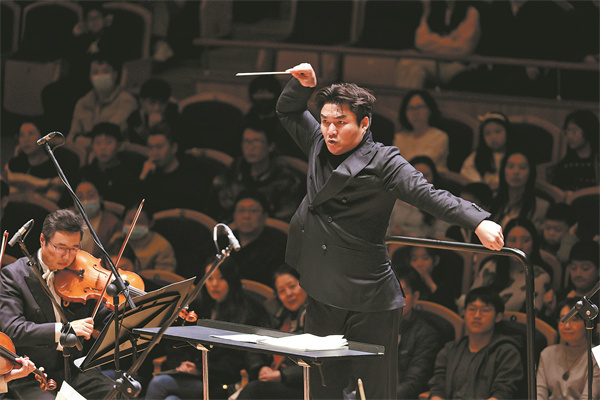Orchestrating a prestigious career
Inspired by master composers, musician strings together his dream of becoming a conductor, Chen Nan reports.
By CHEN NAN | China Daily | Updated: 2024-06-01 10:44

German composer Johannes Brahms' Symphony No 1 in C Minor, Op 68, is a magnificent work of classical music. Considered one of the masterpieces of symphonic repertoire, it continues to captivate music lovers worldwide since its premiere in 1876.
For Qian Junping, the memory of his first encounter with this masterpiece remains vivid. When he was a 16-year-old student, he returned to Shanghai from a music festival abroad. Upon landing, he went straight to a concert, which had this piece by Brahms on the program. Suffering from jet lag, he fell asleep during the first movement. He didn't wake up until the fourth movement, which Qian recalls as "brilliant".
"Compared to the first three movements, which portray the composer's complex web of conflicting ideas, the fourth movement is like a beam of light in a cloudy sky. With rhythms becoming increasingly faster, the bustling energy drives the music toward its overwhelming climax," says Qian, who later listened to the piece over and over.
On May 17 and 18, Qian conducted the China NCPA Orchestra, the resident symphony orchestra of the National Centre for the Performing Arts in Beijing, performing Brahms' Symphony No 1 in C Minor, Op 68.
Qian's performances of Brahms' work closed the project of the NCPA, which has four conductors — Daniele Gatti from Italy, Chung Myung-whun from South Korea, and Lyu Jia, chief conductor and music director of the China NCPA Orchestra — playing Brahms' four symphonies with the China NCPA Orchestra.
"For conductors, diving into a composer's score entails analyzing every note, rhythm and dynamic marking to comprehend the intended emotional and musical journey," Qian explains. "It's a task that endlessly fascinates me."
He draws parallels between conductors and directors, likening their relationship to that of film directors and scriptwriters.
"Once a composer completes a piece, their role ends. It's up to the conductor to breathe life into the score onstage," he says. "Conductors decode and interpret the composer's musical language, delivering its essence to audiences."
























